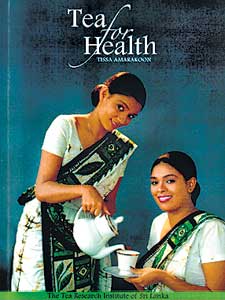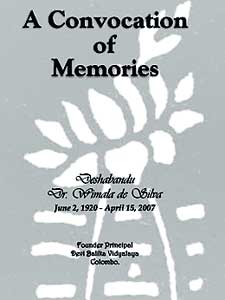
Kala KornerA healthy cuppa Walking into the Tea Board sales outlet at Bambalapitiya to buy a couple of family packs, I noticed a booklet on the counter titled 'Tea for Health'. Glancing through the pages I thought it would be an interesting read. It is indeed! Like many others, I always thought green tea is better than the normal tea we drink, the general perception being that green tea had more herbal properties. The booklet says something different. Research done in reputed laboratories around the world has shown regular drinking of both black and green tea could reduce the risk of degenerative diseases which are becoming widespread with industrialization. Heart disease, stroke, cancer and diabetes have been identified as the commonest degenerative diseases, also referred to as diseases of civilisation.
A Tea Research Institute publication, 'Tea for Health' is the work of Dr. Tissa Amarakoon, a Senior Research Officer attached to the Biochemistry Division of the Institute. He has done a lot of work on tea and his Ph.D thesis (from University of Southampton, UK) has been on 'Anti-oxidant activity and immuno-modulatory properties of black tea'. Describing tea as second only to water as the most favourite beverage on earth, he begins the narration with the history of tea that goes back to 2737 BC when a few tea leaves that fell by chance into Chinese Emperor Shen Nung's drinking water made a remarkable impact on his drinking habits. To the emperor initially it was a drink more pleasant than hot water. However, convinced that it improved the health, he recommended it as a "remedy for kidney trouble, fever, chest infection and tumours that come about the head". Soon the habit of tea drinking spread throughout China and then to other parts of the world. After describing the different types of tea – Black (78% of world's production), Green (20%) and Oolong (2% - consumption & production limited to Taiwan and certain parts of China), Dr. Amarakoon points out that tea (without milk and sugar) does not contain significant amounts of nutrients and that the calorific value of tea is almost zero "making it an ideal drink for the modern day calorie conscious consumer". Although rich in potassium, the sodium content of tea is low. Saying that caffeine and polyphenols, the major non-nutrient components in tea, have pharmacological effects, he states that caffeine, the well-known stimulant, acts on the central nervous system, increases alertness and reduces feelings of drowsiness and fatigue. Tea also contains significant amounts of fluoride, he says, which helps to reduce tooth decay. Discussing tea and heart disease, Dr. Amarakoon says tea reduces oxidation of fat, cholesterol, blood clotting and improves the proper functioning of the arteries. He also talks about tea and cancer as well as tea and diabetes, and tea and intestinal bacteria. The 37-page booklet is easy reading. The facts are presented in a convincing manner. A tribute to Wimala
"Convocation of Memories" a book of tributes to Late Deshabandu Dr. Wimala de Silva and her writings during the last few years of her life will be launched on June 2 at 5.30 p.m. at the Dr. Wimala de Silva auditorium, Devi Balika Maha Vidyalaya, Colombo 8. Dr. Wimala de Silva was the founder principal of one of Colombo’s leading girls’ schools, Devi Balika Maha Vidyalaya. Known as “Mrs Silva” to hundreds of her students at Devi, she was an iconic figure in their lives as well as in the history of the school. The book is a testimonial to her contribution to the school’s development as well as to her indelible personal touch with her commitment to the personal development of her students and her staff that extended far beyond their schooldays. The tributes are filled with memories and anecdotes of schooldays as well as expressions of gratitude and deep respect for a beloved teacher and principal. They illustrate the imprint left on the writers of her equanimity, vision and grace. This book is produced by “Friends of Dr. Wimala de Silva”, a group of past pupils, teachers, relatives and well-wishers of Devi Balika dedicated to keeping alive her memory. |
|
||||||
|| Front
Page | News | Editorial | Columns | Sports | Plus | Financial
Times | International | Mirror | TV
Times | Funday
Times || |
| |
Reproduction of articles permitted when used without any alterations to contents and a link to the source page.
|
© Copyright
2008 | Wijeya
Newspapers Ltd.Colombo. Sri Lanka. All Rights Reserved. |

